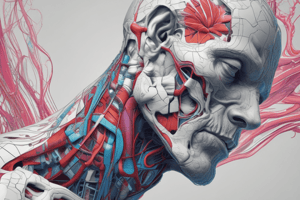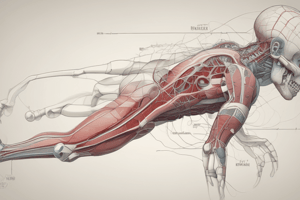Podcast
Questions and Answers
The human body is organized into several levels, from simplest to most complex, starting with the ______ level: atoms and molecules
The human body is organized into several levels, from simplest to most complex, starting with the ______ level: atoms and molecules
chemical
The ______ cavity contains the brain and spinal cord
The ______ cavity contains the brain and spinal cord
dorsal
The ______ region includes the head, neck, thorax, and abdomen
The ______ region includes the head, neck, thorax, and abdomen
axial
The ______ direction is towards the front
The ______ direction is towards the front
The ______ plane divides the body into left and right halves
The ______ plane divides the body into left and right halves
The ______ level is composed of groups of similar cells
The ______ level is composed of groups of similar cells
The ______ cavity contains the lungs, heart, and major blood vessels
The ______ cavity contains the lungs, heart, and major blood vessels
The ______ direction is towards the midline
The ______ direction is towards the midline
The ______ level is the entire human body
The ______ level is the entire human body
The ______ region includes the upper and lower limbs
The ______ region includes the upper and lower limbs
Flashcards are hidden until you start studying
Study Notes
Organization of the Human Body
- The human body is organized into several levels, from simplest to most complex:
- Chemical level: atoms and molecules
- Cellular level: cells
- Tissue level: groups of similar cells
- Organ level: structures composed of two or more types of tissues
- Organ system level: groups of organs that work together
- Organismal level: the entire human body
Body Cavities
- The human body has two main cavities:
- Dorsal cavity: contains the brain and spinal cord
- Ventral cavity: contains the thoracic and abdominopelvic cavities
- Thoracic cavity: contains the lungs, heart, and major blood vessels
- Abdominopelvic cavity: contains the digestive organs, kidneys, and reproductive organs
Body Regions
- The human body can be divided into several regions:
- Axial region: includes the head, neck, thorax, and abdomen
- Appendicular region: includes the upper and lower limbs
- Upper limb: includes the shoulder, arm, forearm, and hand
- Lower limb: includes the hip, thigh, leg, and foot
Body Directions
- Anatomical directions are used to describe the location of body structures:
- Superior: towards the head
- Inferior: towards the feet
- Anterior: towards the front
- Posterior: towards the back
- Medial: towards the midline
- Lateral: away from the midline
- Proximal: towards the trunk
- Distal: away from the trunk
Body Planes
- The human body can be divided into three main planes:
- Sagittal plane: divides the body into left and right halves
- Frontal plane: divides the body into anterior and posterior halves
- Transverse plane: divides the body into superior and inferior halves
Studying That Suits You
Use AI to generate personalized quizzes and flashcards to suit your learning preferences.




